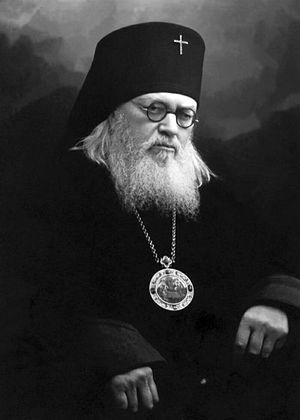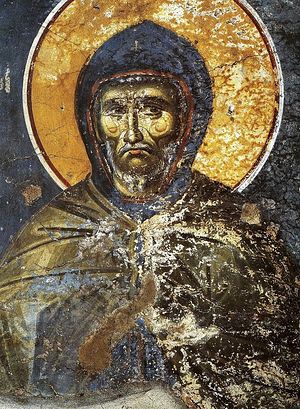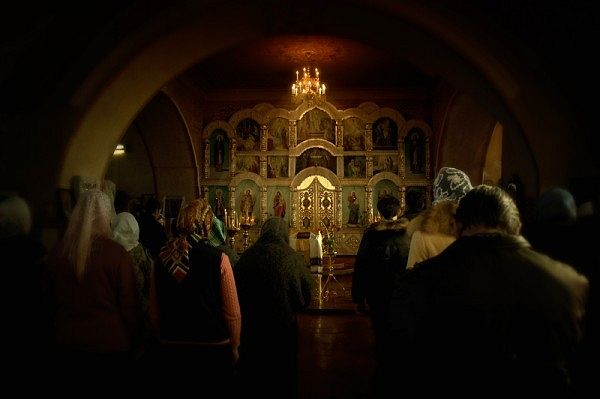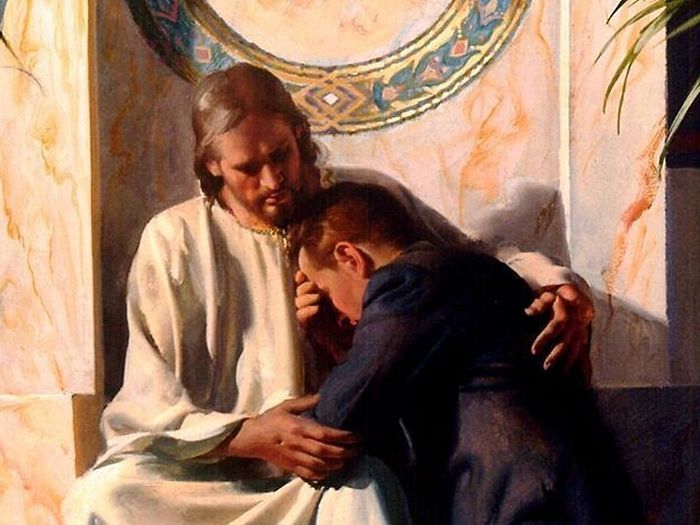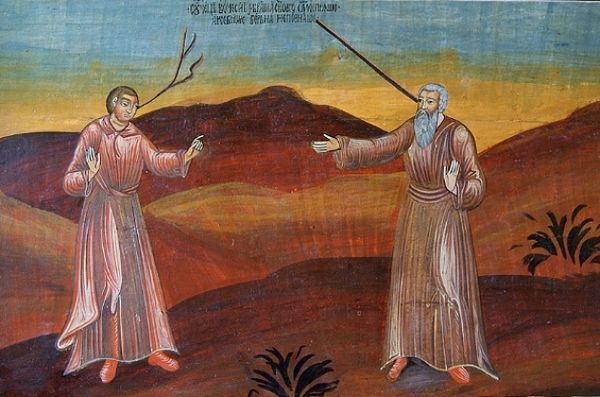St. Luke (Voino-Yasenestky) (1877–1961), Archbishop of Simferopol and Crimea, was a great saint of our own times. A surgeon and medical scholar by profession, he became a bishop during fierce persecutions against the Church, knowing that his path would lead to prison and exile. His numerous works are preserved for us and inspire us in the spiritual life.
In reading this explanation of this prayer, repeated many times at every service during Great Lent, may we discover new meaning and inspiration for our Lenten struggle.
* * *
O Lord and Master of my life! The spirit of idleness, despondency, ambition, and vain thoughts give me not! But rather a spirit of chastity, humble-mindedness, patience, and love bestow upon me Thy servant. Yea, O Lord King, grant me to see my failings and not condemn my brother, for Thou art holy unto the ages of ages. Amen!
The prayer of St. Ephraim the Syrian occupies a special place in the services of the Holy Church. It is repeated many times during the services of Great Lent.
This prayer penetrates the heart like none other, mysteriously acts upon it, and you feel a special, exceptional divine power in it. Why is that so? Because it was poured from a heart that was perfectly purified and holy, and from a mind that was enlightened by divine grace and had become a participant in the mind of Christ. It is short, but it nevertheless contains an enormous wealth of thoughts and feelings. Extraordinarily important is the very fact that St. Ephraim asks God to deliver him from everything unholy and repugnant to Him, and to vouchsafe him great virtues. Why does he ask for this?
There are people—and there were especially many during pagan times—who rely entirely upon themselves and think that everything is achievable through the powers of their minds and feelings. They do not understand that many things, in fact the most important, precious and cherished things, are not accessible to our minds and feelings. Whoever understands this understands what the apostle Paul said: For that which I do I allow not: for what I would, that do I not; but what I hate, that do I(Rom. 7:15).
Thus spoke the greatest and chief apostle, recognizing his powerlessness to walk the path of goodness, profoundly understanding that his flesh, which drags him down and hinders his heart’s ascent on high to God, has enormous power over him. He pined and suffered because he did not do the good that his soul desired, but did the evil that he did not want.
Deeply aware of this, St. Ephraim the Syrian prayed to God that He would deliver him from wickedness, that He would give him the strength to do good. The strength to do good works, like the strength to be freed from vices, is something we receive only from God. The soul of every Christian is vaguely aware of this, and that is why the prayer of St. Ephraim the Syrian so touches it.
Every man has his own spirit—in his soul are the traces left by those vices in which he sins, as well as by the good that he does. It is much easier to be freed from individual vices than from the spirit of these vices. The latter is possible only gradually, with God’s help.
And so St. Ephraim the Syrian asks God not only to give him the spirit of virtues and deliver him from the spirit of his faults, but he asks that his soul would become fragrant with Christ.
1. Idleness—the mother of sin.
“O Lord and Master of my life! The spirit of idleness give me not!” Why does St. Ephraim the Syrian begin his prayer with a request about idleness, as if there are no worse faults?
In observing idleness from the ordinary, everyday point of view we see that idleness is contemptible, and deserves all condemnation.
Idleness is a very dangerous vice, because it is the mother of many other vices. Idle people do not concentrate their thoughts on the profound seriousness of life, the huge responsibility that lies on them not only before people, but also before God Himself.
The idle person is a harmful member of society and state. Out of their laziness idle people are incapable of working, and fall into poverty. Because they are needy they demand not only what is necessary for life, but even pleasures that exceed the limits of what is necessary—luxuries, and so forth. And in order to get money they invent various other sinful means and become capable of every low thing: shadowy business, lies, deceit, and bribe-taking.
But even more destructive is idleness in spiritual life. We know that any of our abilities left without practice are eventually lost. If a musician who has achieved perfection in his playing abandons his music for many years he will lose that perfection. Without exercise, each organ of our body comes to a flaccid state and can’t operate. A person who always lies around loses the ability to walk. Whoever does not work with his hands brings his arm muscles to a state of flabbiness. The body’s strength wanes when physically inactive. The same can be said of the soul’s abilities. If a person does not pray he looses the ability to pray. Whoever does not watch after his spirit and heart will become dissolute in the spiritual sense.
The soul left without exercise becomes like a field that has not been cultivated for several years, overgrown with tall, useless weeds, thorns and thistles, and very hard to make fertile. Idleness of the soul, lack of practice in good deeds leads to the soul’s destruction, to an overgrowth in it of the weeds of sin.
Just the same, no matter how hard it may be this is not the worst problem. A much greater problem is that we lose days of spiritual activity—the short days of this life, given to us by God so that we might achieve a great and holy goal—to prepare ourselves for the Last Judgment. We must become worthy in God’s eyes so that He would not place us on His left side, saying, Depart from me, ye cursed, into everlasting fire, prepared for the devil and his angels (Matt. 25:41).
Life is given to us so that we would hasten to do the great deed of purifying our hearts, following after our Lord Jesus Christ. And this following is after all intense, often difficult labor, and not idleness. This is the bearing of suffering for our Lord Jesus Christ, while idleness runs away from suffering.
Do you know that all the saints who, it would seem, did not need labors and dedicated the whole time of their lives to spiritual podvigs, divided the day into three parts: one part was given to prayer, another to reading the Word of God, and another to work. They were all foreigners to idleness, considering it a great and destructive evil.
They chose various labors: weaving baskets and mats, gardening, chopping wood, and building cells, churches, and whole monasteries. They sold their handiwork in the nearby town, and fed both themselves and the poor. The holy apostle Paul preached the whole day through, and at night he made tents. He labored diligently by the light of the moon or lamps, considering labor to be mandatory for him. His main striving was to hasten as much as his strength allowed toward the mark—the Kingdom of God. He has these remarkable words: Brethren, I count not myself to have apprehended: but this one thing I do, forgetting those things which are behind, and reaching forth unto those things which are before (Philip. 3:13–14). This is an example of life contrary to the lives of idle people.
You can’t find a trace of idleness in the life of Apostle Paul, in the lives of the eremitic fasters, in monastic life, in the lives of great saints. They were all foreign to it, considering it a great and destructive evil. Remember that life is short, and we have to hurry like the apostle Paul to work for the Lord.
2. Terrible is the Spirit of Despondency.
“O Lord and Master of my life! The spirit of despondency give me not!” What is the spirit of despondency? It is what they call falling in spirit. People who have no understanding of Christianity look at monks wearing black clothing and with lowered heads, fingering their prayer ropes, and think that all religion is depressing. But that’s not how it is at all. That would contradict the spirit with which all of Christianity is permeated; for, tell me, can a depressed person possess the spiritual strength and energy needed to walk the narrow path, indefatigably warring with the sinfulness of life and ascending from strength to strength?
Of course not! Our religion is not the religion of depression, but cheerfulness, energy, strength of will and character, which has as its fruit not depression but something absolutely opposite—what the holy apostle Paul spoke of: But the fruit of the Spirit is love, joy, peace, longsuffering, gentleness, goodness, faith, meekness, temperance: against such there is no law (Gal. 5:22–23). This is the true spirit and essence of our religion—not depression, but righteousness and peaceful joy in the Holy Spirit. Could anyone who possesses this joy be depressed? Of course not!
People are often mistaken when they evaluate a person’s appearance. The true Christian does not have an appearance that would betray his joy of life. He is always peaceful, often apparently deeply immersed in thought, betraying his contemplation. His thoughts are concentrated on the eternal, on the Kingdom of God, turned to the Lord Jesus Christ—and therefore he is always serious.
It can happen that a Christian [ascetic] becomes despondent from time to time. This happens to those who, having travelled far on the path to Christ, the path of renouncing the temptations of the world, sometimes return to their former path; it seems to them that they were wrong to leave that path, the path that most people follow. Then they fall into despondency.
The devil tempts them, legions of demons stop their movement and hinder them along their path of Christ, presenting them pictures of family happiness and blessed friendships, and pull them back from this great path to that former path. And not rarely do the demons succeed in their aim—the ascetic falls in spirit and loses his zeal for the Lord Jesus Christ. Despondency is a great danger that waylays a Christian on his path to Christ. It is a diabolical temptation.
All the saints were subjected to these attacks from the spirits of darkness, and in the vast majority of cases, by prayer, fasting, and vigils Christians have conquered the spirit of despondency brought on by the devil.
But there were also those in whose souls the spirit of despondency simply grew, and they departed from the path of Christ. And when they left it, they felt abandoned by God, the emptiness and heaviness of life became unbearable to them and they often ended their own lives with suicide. This is why all the saints considered despondency to be a great danger and misfortune, and directed all their forces to battle against the spirit of despondency.
Sometimes, when a person has attained to a lofty life, he can get a high opinion of himself—and then God’s grace leaves him for a time. Then he falls into a heavy, unbearable state of spirit—his heart immediately becomes empty. Instead of warmth and joy there is deep despondency. The Lord does this in order to remind the ascetic that he walks the path of Christ not through his own strength but by the grace of God. This is one source of despondency.
What other sources of despondency are there? Idleness is one of the mothers of despondency. Idle people who do not work and yet are materially well off, who are satiated with the good things of this life and drowning in luxury, lose the taste for life. They become jaded, everything becomes uninteresting and boring, nothing brings them joy, and their hearts become filled with despondency—the terrible and dangerous enemy of our salvation.
Yet another source of despondency is pessimism. Pessimists tend to see everything in a murky light, to concentrate on the dark and sinful. If a person notices only the dark and the bad in life the despondency that has taken over the mind grows to the point where the person doesn’t see anything good, and ends his life in suicide. That is how strong the spirit of despondency is.
The most often-encountered source of despondency is bitterness and sorrowful events that people experience in life. A close one dies, a husband or son, and the mother falls into serious depression. This mother sees nothing good in the world. She thinks only about the deceased one, wanders in thought around his grave, imagines him lying in the coffin, and her depression spirals ever deeper.
How can one be freed of this? One mustn’t remember the past and keep shedding tears. The deceased is very, very far away. His soul is standing before God and the angels, rejoicing over his freedom. One has to exert every effort to be carried in thought to that place where the dearly beloved now is. If we concentrate not on the dark and corruptible but on the eternal, the spirit of despondency will go away.
Sometimes serious illnesses can throw one into despondency. There are many people who do not patiently endure illnesses. But there were saints who were sick and bedridden all their lives, and yet they praised God for it. We have to remember such people and know how to accept the illnesses sent by God. We should not refuse the help of a doctor, for the wise son of Sirach says, Honour a physician with the honour due unto him for the uses which ye may have of him: for the Lord hath created him(Eccl. 38:1 KJV). A doctor is God’s servant, who can relieve suffering and thereby drive away the spirit of despondency.
Such are the sources and causes of despondency. The main means for struggling with them, tested many years by all the saints, is prayer. There is nothing more effective than prayer, the constant asking for help from God.
When you begin to converse with God, He consoles you, and routes the spirit of despondency. And if you open your heart before a pastor of the Church at confession and then receive the Body and Blood of Christ, you will feel relief and joy, and the spirit of despondency will be driven away from you in disgrace.
Do not concentrate on the dark, sinful, and heavy; ascending on high in spirit, in your heart abide with God, in the heavenly chambers, where the dark spirits have no access.
And what is there to be said about people who practically do not know Christ, who seek the worldly path, who seek joy and consolation from the world? Outwardly they often seem satisfied, cheerful, and happy, as if they have no despondency. Do not think that that is true. In the depths of their souls their consciences do not cease to reprove them, and no one can completely lull his conscience. This is the constant suffering of those who chase after worldly prosperity. The apostle Paul says, For godly sorrow worketh repentance to salvation not to be repented of: but the sorrow of the world worketh death (2 Cor. 7:10).
If you don’t turn from sorrow for the world to sorrow for God, you will perish! Remember the seriousness of despondency. Remember that the heart of a Christian should be filled with the joy of reaching for the light; it should be foreign to the sadness that fills the hearts of sinners.
May the Lord God have mercy on you, and may St. Ephraim assist you in your prayers!
3. The Passion of Ambition (Lust for Power)
“O Lord and Master of My Life! The spirit of ambition give me not!” What is the spirit of ambition (lust for power)? It is the desire to be always first, to have authority over others. It destroyed the archangel, the chief of all angels, making him satan and casting him down from heaven; it destroyed Korah, Dathan, and Abiram, who envied the glory of Moses when he led the people of Israel through the desert to the land of Canaan. Ambition motivated all the heretics, who wanted to install their own teachings in place of the teachings of the Church and become the leaders of the Church. There have also been writers with depraved thoughts, who have corrupted whole generations.
The Lord Jesus Christ condemned love of power—the passion of the scribes and Pharisees to be first, their desire to sit at the head of the table at feasts, to receive greetings appropriate for rulers of the people. The Lord said to His disciples and through them to us, If any man desire to be first, the same shall be last of all, and servant of all (Mk. 9:35). Love of power is against the spirit of the Gospel, against the spirit of humility. Nevertheless this passion has a grip on everyone, and there is no one who is not infected with it—even little children.
Everyone tries to attain a high position, thirsts for promotions, desires honor. Many parents raise their children to be ambitious, to have the passion for being first, and corrupt them this way.
Is it so hard to understand that top positions are for the few? Everyone can’t be first. Essentially this is the destiny of exclusive people, marked by God. An extraordinarily large number of people strive to occupy high positions in society, and are not beneath any means in order to attain this goal; they will use connections, curry favor, or become lackies only so that they can get their aim.
Very often the Lord punishes them; their wretched passion ends in failure. They become embittered, refuse to do any community work, retreat into family life and close themselves up in it. But love of power torments them even there, and they torment their family members. There is no peace in their souls.
This is why St. Ephraim the Syrian in his great prayer asks God to save him from the corrupting spirit of ambition so contradictory to humility.
We have all been shown the path to honor, an honor above all honors, with which no earthly achievements can compare. It is the path to the Kingdom of God, where we can become friends, children of God. We will achieve this goal only by striving to fulfill all the commandments of Christ.
We have to remember that the Lord can bring us out to the broad path when we do not seek it, when we do not aim for earthly glory. He often gives us this glory aside from our own strivings and will. True glory flees from those who chase after and thirst for it, and finds those who run from it.
Without thinking about authority over other people, we need to delve into how we can develop our abilities and talents given to us by God, to further the development of our abilities quietly, unknown to the world. And it can turn out the way it has turned out many times, that the Lord raises such a person up to an unreachable pinnacle of glory. Remember that the Lord knows how to indicate people, to distinguish human works done according to Christ’s commandments. If any man desire to be first, the same shall be last of all, and servant of all.
Pray with St. Ephraim the Syrian to be delivered from the serious vice of love of power!
4. The Ability to Guard the Lips.
“O Lord and Master of my life! The spirit of idle talking give me not!” St. Ephraim prays for this, the holy prophet David says in his psalm, Set, O Lord, a watch before my mouth, and a door of enclosure round about my lips (Ps. 140:3), and the Lord Jesus Christ Himself said that That every idle word that men shall speak, they shall give account thereof in the day of judgment (Mt. 12:36). How serious and difficult it is to give account of every such word. And could there be anything else that could be easier to regard than words?
Our ability to say words to a significant degree makes us like unto God Himself. God created the world with a word, and the word of God has enormous, mighty power. The human word is also powerful. With a word the prophet Elias raised the dead, closed the heavens, brought rain to the earth and stopped it.
What is the power contained in a word? A word lives; it lives a hundred, a thousand years. The words uttered by God’s great prophets, who lived many centuries before the birth of Christ, the holy apostles, and divine ascetics are still alive today. The teaching of God’s Church has lived for millennia. And if a word lives a thousand years, that means it is very important. A word that leaves our lips always produces an extraordinarily profound effect not only on those around us but even on people far away from us.
The grace-filled and wise words of the saints foster righteousness in the world, create eternal goodness, while evil, sinful words bring dishonor, hatred, and enormous harm to all mankind. Words live, they are carried off like radio waves into space and pour into people’s hearts and minds.
A word is a huge force that either unites or divides people. If people were deprived of words they would be like the animals, and human life would be undone. How great and profound is the meaning of the human word!
We have met no few people in our lives, particularly women, who gab unrestrainedly and endlessly, and their tongues know no fatigue. Everything they say is empty and of no use to anyone.
St. Ephraim the Syrian prayed to God to deliver him from idle talk. He was afraid of falling, so that his tongue would not destroy him, and these wretched chatterers have no fear. People often put up with them—might as well let them chatter. They think that they are being listened to with pleasure, but everyone in the depths of their hearts is tired of them. If the tongue wags and talks idly, then the thoughts roam aimlessly, not concentrating on anything profound, true, or important. The soul hungers, the person is obnoxious to others, and causes serious harm to his own self. Such is the meaning of idle talk. Wise people who live a spiritual life never talk idly. They always tend to be silent and concentrated.
How can we get away from the vice of idle talk, what can we do with our unrestrained tongue? We need to do what St. Ephraim the Syrian does: pray to God for deliverance from this vice, and the Lord Jesus Christ will grant what we ask. We need to avoid communication with idle talkers, and seek the company of a few wise people, who only open their lips to say something beneficial. We need to be extremely attentive to ourselves, to acquire the habit of watching what our tongue says, what it is occupied with, and get used to keeping a reign on it—not allow it to wag idly.
The more a person concentrates on the most important, the interior, the true, the more time he has to read the Gospel, the Holy Scripture, the works of the holy fathers, and especially fathom their wisdom and aversion to idle chatter.
It is a great thing to acquire power over the tongue! The holy apostle James in his epistle wrote, If any man offend not in word, the same is a perfect man, and able also to bridle the whole body (Jas. 3:2). This means that subjugating the tongue is the highest goal of spiritual life—to bridle everything bad, to which the flesh is drawn. Start with bridling the tongue, and if you achieve this goal, you will achieve perfection and bridle your whole body. And once you have bridled your whole body you will be pure and righteous before God.
May the Lord vouchsafe all of you this purity and righteousness, and may the prayer of St. Ephraim the Syrian always remind you of this.
5. Forbidden Fruit
“O Lord and Master of My Life! Give me the spirit of chastity!” This great ascetic and desert dweller, St. Ephraim the Syrian, prayed that the Lord give him the spirit of chastity. Could it really be that he had need of that prayer? He considered that he needed to pray for this, and all the saints prayed for this. Why? They knew that the Lord requires of them, as from all Christians, total, unconditional chastity not only of the flesh, but also of the spirit.
We do not and should not dare to violate chastity even in our thoughts, for the Lord Himself said, that whosoever looketh on a woman to lust after her hath committed adultery with her already in his heart (Matt 5:28). And no one can escape unclean thoughts; even the saints painstakingly struggled for many years with these thoughts.
St. Martinian, a young man, struggled desperately with this passion. When a profligate woman managed to get into his cell and tempt him, he stood on hot coals in order to overcome fleshly passion in himself.
So the saints struggled; they struggled stubbornly, for decades, and the main means for their struggle were fasting, humility, and prayer; for all the holy fathers say that there is no greater defense from fleshly desires than humility. If a person acquires humility he is freed of those desires, while those who are proud and foreign to humility are wholly overcome by this low passion.
How many Christians there are among us who do not consider this sin to be serious. “After all, I am pious,” they say, “I try with all my strength to fulfill the commandments of Christ and do works of mercy. Won’t the Lord forgive me this slight weakness?” Those who talk like that are deeply mistaken, for what they call a “slight weakness” the apostle Paul calls something entirely different. He is so strict in this regard that in his Epistle to the Ephesians he says, But fornication, and all uncleanness, or covetousness, let it not be once named among you, as becometh saints (Eph. 5:3). We mustn’t even think about them or talk about them, as becometh saints.
He says that neither fornicators, nor idolaters, nor adulterers, nor effeminate, nor abusers of themselves with mankind … will enter the kingdom of God (cf. 1 Cor 6:9, 10). Isn’t the apostle pointing out that a sin against the seventh commandment is not just a weakness that God will forgive?
And where will the adulterers and fornicators be? Of course, in a place of darkness and eternal torments. Do not think that this passion is natural. Man’s nature is structured so that that people would give birth to children, and not so that they would defile their own selves. For, as the apostle Paul says, Every sin … is without the body (1 Cor. 6:18): pride, ambition, love of honor, envy, or anger, because these are passions of the soul; but fornication and adultery are in the body itself and defile not only the soul but also the body.
Didn’t he say that our body is a temple of the Holy Spirit (cf. 1 Cor. 6:19)? And if it is a temple, then it should be pure. To destroy the temple of the Holy Spirit, to make our bodies the members of a harlot, as the apostle exclaims, God forbid! (cf. 1 Cor. 6:15).
How many people there are among those who turn their fleshly passion into continual gratification, which makes them equal to the animals, who are distinguished by particular lustfulness. It is shameful for a Christian to be the same as a peacock.
For, says the apostle Paul in his Epistle, this is the will of God, even your sanctification, that ye should abstain from fornication: that every one of you should know how to possess his vessel in sanctification and honour; not in the lust of concupiscence, even as the Gentiles which know not God (1 Thess. 4:3–5). For God hath not called us unto uncleanness, but unto holiness (1 Thess. 4:7).
He said, And they that are Christ's have crucified the flesh with the affections and lusts (Gal. 5:24). If you want, remember this: You should crucify, mortify your flesh along with the passions and lusts. Needed is an enormous, daily struggle with all the flesh.
Those who have fallen into sin against the seventh commandment have to climb out of the abyss of that fall, calling for help from the One Who gave the commandment of chastity (cf. Ex. 20:14; Matt. 5:27–28); fervently pray and constantly remember what the apostle himself says: And be not drunk with wine, wherein is excess (Eph. 5:18). In wine is fornication, for nothing so arouses our lusts as drunkenness—after getting drunk, a person becomes a plaything in the hands of the demon of fornication.
Whoever eats a lot, is always idle, does not want to work, is occupied only with entertainments, dancing, going to theatres and movies, and sleeps like a pampered woman till eleven in the morning will of course become a fornicator, for he is doing everything to make fleshly lust take him down its own path.
But if a person is busy constantly with physical or intellectual labor, he has no time to be distracted from his work. Having finished his work, in the evening he will only long for rest; he has no interest in lusts or debauchery. Therefore, the means for being freed from the rule of the demon of fornication are humility, fasting, intense labor, and constant prayer.
How infinitely many wretched people there are, especially among the young, who read with great relish passionate novels and stories or watch films in which there are dirty scenes of debauchery. What a poison and igniting of lust this is!
We should do otherwise—we should not ignite lust with pornographic descriptions and scenes, but strive to check it. As soon as we notice that lustful images have appeared in our thoughts we have to try to grab the snake by the neck and smash its head, for if we do not do it immediately it will imperceptibly creep into our hearts and turn them to the passion of fornication. We have to remember what the prophet David said in Psalm 136: Blessed is he who takes the infants and dashes them against the rock (cf. Ps. 136:9). The infants are our lusts and passions, and we have to war with them right away, before they have grown strong, before they have taken over our hearts.
Only when you have corrected yourself and received forgiveness of this sin in the Sacrament of confession will you be able to have access to the Holy Chalice.
This is a serious matter. Now you can understand why St. Ephraim the Syrian prays to God that the Lord would give him the spirit of chastity. Let all of us who are guilty of this sin also pray to God for salvation and call out like St. Ephraim: Help us, help us in this struggle. We are weak, and You are strong!
6. Humility is the Root of Everything
“O Lord, give the spirit of humility to thy servant!” The commandment of humility is the first commandment of the Beatitudes, and that means it is the most important one. Remember the word of God pronounced by the prophet Isaiah: For thus saith the high and lofty One that inhabiteth eternity, whose name is Holy; I dwell in the high and holy place, with him also that is of a contrite and humble spirit, to revive the spirit of the humble, and to revive the heart of the contrite ones (Is. 57:15).
Don’t you want God to live with you? He Himself says that He lives in the hearts of the humble and revives them; and we so badly need out hearts to be revived! God looks down on the humble of heart. Remember the words of the holy apostle James: Wherefore he saith, God resisteth the proud, but giveth grace unto the humble (Jas. 4:6). Don’t you want to receive grace? And if you want it, then remember what humility is, that it is a sacred virtue very pleasing to God, and for which God lives with us and looks down upon us. Humility is the opposite of pride.
The humble are the poor in spirit, who while remembering their failings turn their gaze to the depths of their hearts, constantly watching after every movement of the heart, watching every impurity that has penetrated it. The saints, who always fulfilled the commandments of Christ, before whose mental gaze the Lord always stood, constantly remembered humility and prayed for it.
Christ says, Learn from Me, for I am meek and lowly of heart (Matt. 11:29). The Lord commands us to learn humility from Him, and humility was shown through His entire earthly life. Human lips dare not speak of the humility that He manifested at the trial against Him, and later when He was led to Golgotha and crucified on the Cross—so great it was. This is the humility of the Savior.
Humility is a quality of the human soul that the proud stigmatize contemptuously, for such people do not believe in Christ and have chosen other ideals in life. They call humility slavery, and the humble—slaves deprived of the most required and necessary quality: the spirit of protest, of forceful opposition to mankind’s serious misfortunes. They contemptuously stigmatize humility, and exalt the energy of rebellion and protest.
However the humble are not slaves submitting to force, but spiritual victors over evil. Only they lead a true struggle with evil, for they uproot the very sources of it in their own hearts and the hearts of others. They do not believe that the cause of evil lies solely in the imperfection of social relationships. The humble man is a true warrior of Christ, and not a slave. But truly humble people are very hard to find these days—no one thinks about humility; it is practically forgotten.
Only those who walk the path of Christ and who learn from Him spiritual lowliness think about humility. Only the saints are truly humble. The basis of their sanctity consists in the fact that they never exalt themselves over others, but judge only their own hearts.
Proud and arrogant people judge and discuss everything without giving it a thought, even what is most lofty and sacred; while the humble are bereft of all arrogance; they are modest and quiet. There are many examples to prove this in the Holy Scriptures and the Lives of the Saints. Righteous Abraham was great before God, he heard the great commandments and was called a friend of God, but he never ceased to call himself dust and ashes; the prophet and king David sincerely said of himself, I am a worm, and not a man, a reproach of men (Ps. 21:7); the apostle Paul called himself the chief among sinners, was alien to arrogance and self-aggrandizement, and was not afraid to admit his weaknesses: I was with you in weakness, and in fear, and in much trembling (1 Cor. 2:3). Such profound humility is an example to all of us, who are infinitely far from it.
We need to think all the time about it and ardently ask God about it. We cannot acquire this virtue through any of our own efforts. Humility is a great gift of God. And every step along the path of Christ brings us closer to it. When a man’s heart is humble, the Holy Spirit comes to abide in it. What great happiness it is to be humble, and how difficult this is.
The Lord Jesus Christ said to His disciples, But he that is greatest among you shall be your servant. And whosoever shall exalt himself shall be abased; and he that shall humble himself shall be exalted (Matt. 23:11-12). How often these words of Christ’s come true! How many proud people there have been who try to be above everyone else later fall lower than everyone; and how many humble, insignificant, poverty-born people who began their lives in hardships and suffering, who later became great people. This is the story of many saints.
The Lord says: But many that are first shall be last; and the last shall be first (Matt. 19:30). That is how it is in life, and that is how it will be at the Last Judgment: The first proud and impudent will be the last, while the last—the insignificant and despised—will be the first.
We should remember the words of the holy apostle Peter: Likewise, ye younger, submit yourselves unto the elder. Yea, all of you be subject one to another, and be clothed with humility: for God resisteth the proud, and giveth grace to the humble(1 Pet. 5:5). God gives grace to the humble. We have to strive towards humility, and constantly ask God for it.
O Lord and Master of my life, the spirit of humble-mindedness give me Thy servant! If a person will continually have these holy words in his memory, he will receive from God the profound virtue of humility.
7. Salvation is in Patience
“O Lord and Master of my life! Give me the spirit of patience!” Oh, how we need to ask for the spirit of patience! After all, the Lord said: In your patience possess ye your souls (Lk. 21:19). Why is that so? Because, says Jesus Christ, strait is the gate, and narrow is the way, which leadeth unto life, and few there be that find it (Matt. 7:14). The path of Christian life is the path of sufferings and sorrows. The Lord warns that In the world ye shall have tribulation: but be of good cheer; I have overcome the world (Jn. 16:33). Only through patience can we save our souls.
The holy apostle James says in his Epistle: My brethren, count it all joy when ye fall into divers temptations; Knowing this, that the trying of your faith worketh patience. But let patience have her perfect work, that ye may be perfect and entire, wanting nothing (Jas. 1:2–4). Do you hear? Patience makes us perfect, without any inadequacies. And the holy apostle Paul writes, For ye have need of patience, that, after ye have done the will of God, ye might receive the promise (Heb. 10:36)—eternal life, the Kingdom of God.
All the apostles, besides St. John the Theologian, endured many great sorrows, persecutions, harassments, and finally martyric death (only the apostle John died a natural death). The signs of an apostle, says the apostle Paul, were wrought among you in all patience, in signs, and wonders, and mighty deeds (2 Cor. 12:12). But in all things approving ourselves as the ministers of God, in much patience, in afflictions, in necessities, in distresses (2 Cor. 6:4). With these words the great apostle showed all of us his apostolic character in great patience. And to his disciple, Bishop Timothy, the apostle enjoined, But thou, O man of God … follow after righteousness, godliness, faith, love, patience, meekness (1 Tim. 6:11). And if the bishop was enjoined to follow after patience, then how could we weak Christians reject this virtue? After all, without patience it is impossible to enter the Kingdom of God.
How can we acquire patience? We need to get used to enduring, trying not to complain, and of course, asking God for help. If we will ask God persistently, then it will happen with us according to Christ’s words: If ye then, being evil, know how to give good gifts unto your children, how much more shall your Father which is in heaven give good things to them that ask him? (Matt. 7:11).
It is pleasing to God for us to ask for patience, and God will help every Christian who calls out to Him from under the weight of his own cross. But evil people seeking the sinful path also ask for help. God will not grant them any help, but the Lord will help to good Christians who humbly walk the path of Christ; after all, in the words of the apostle, God is faithful, who will not suffer you to be tempted above that ye are able; but will with the temptation also make a way to escape, that ye may be able to bear it (1 Cor. 10:13).
Our woes are nothing compared to what our Lord Jesus Christ endured for us. Therefore we must endure, seeking comfort and looking unto Jesus the author and finisher of our faith; who for the joy that was set before him endured the cross, despising the shame, and is set down at the right hand of the throne of God. For consider him that endured such contradiction of sinners against himself, lest ye be wearied and faint in your minds (Heb. 12:2–3).
This is what we have to strengthen ourselves in, and from which we can endlessly draw patience. Gaze more often at the Holy Cross, the Savior crucified on it, and pray together with St. Ephraim the Syrian: “O Lord and Master of my life, grant the spirit of patience to me Thy servant. Amen.”
8. God is Love
O Lord and Master of my life! The spirit of love give to me, Thy servant!” We ask for love, which is the fulfillment of the whole law; for if we do not have love, then according to the words of the apostle Paul we are as sounding brass, or tinkling cymbal (1 Cor. 13:1).
Even if we have the gift of prophecy, great knowledge and faith that can move mountains, but don’t have love—we are nothing. The greatest example of love for us is our Lord Jesus Christ. What He said and did throughout the days of His earthly life, and then manifested on Golgotha, is an unceasing sermon on love.
This means that acquiring love is the greatest and most important task of our lives, about which we should be asking always, persistently and ceaselessly—for our goal is to become closer to God and to become perfect, like our Heavenly Father. Without love we are infinitely far from God.
Love is what all the saints cultivated in their hearts, what is given from God as His supremely great gift of grace for fulfilling the commandments of Christ.
Even if a person was born with a meek heart, he has to endure very much and pass through the path of the cross of suffering so that an ever greater flame of Christlike love might burn in his heart; so that the love he was given from his birth would ever multiply.
Especially abundantly were people’s hearts overflowing with Christ’s love during the time of the apostles, when people loved one another like brothers, fulfilling the commandment of Christ. The Lord could say of them, By this shall all men know that ye are my disciples, if ye have love one to another (Jn. 13:35).
But now has come the terrible time about which the Lord spoke, indicating the signs of His Second Coming: And then shall many be offended, and shall betray one another, and shall hate one another(Matt. 24:10). This is what torments and rends our hearts.
It is unbearably hard to live and see that instead of Christ’s love, mutual hatred rages. What an unspeakable horror we experienced not long ago, when the German people, who confess Christianity, in conjunction with other Christian peoples committed such evil acts and mockery of the law of love as we have never seen. And what was left of the law of love in those evildoers who buried children and old people alive, crushed the heads of newborn babes with stones, and wiped out tens of millions of people?
What can we do, how should we look at this? The Love of Christ should be preserved in the hearts of Christ’s little flock until the Second Coming of our Lord Jesus Christ. Those horrors of life, unrighteousness and violation of love that we see every day and every hour should stir us to warm up this great feeling in our hearts.
Love is only given to those who fulfill the commandments of Christ, who walk without turning back upon the narrow path of suffering, no matter what threatens. And if we steadfastly and unceasingly walk toward the light of love, then we shall reach it.
But can we love people who hate us? It is possible, at least in some small measure. Pity is one form of holy love. Shouldn’t we pity with our whole hearts those who have rejected Christ and walk the path of destruction? It is hard to love them with a pure, full love. But it is possible to pity them, with contrition of heart that these unfortunate people are on the path of destruction.
The great St. Seraphim of Sarov was attacked by robbers who beat him nearly to death, broke his skull and ribs, so that he lost consciousness and lay several months in the monastery hospital until the Most Holy Mother of God came and healed him. How did he relate to his offenders? They were apprehended, handed over to the judge, but St. Seraphim begged with tears that they not be punished, that they be set free. He pitied them, and that means he loved them.
Many saints have shown such love. So does God Himself pity and have patience with sinners. Here is one example of God’s longsuffering. There once lived a terrible robber named Varvar, who murdered over 300 people. But later he brought such repentance to God that he was not only forgiven and beloved of the Lord, he also received from Him the gift of working miracles.
Let no one say, “How can I love those who poison our lives and shame our people?” We have to not curse but pity those people, and then Christ’s love will gradually and imperceptibly penetrate into our hearts. The man who always strives to please God, prays, humbles his flesh, and tries to help people around him, will without fail acquire this great feeling and love of Christ, and it will be poured to overflowing into his heart, as it did into St. Seraphim of Sarov for all the thousands of sinners to came to him.
Pray for such love to God with the words of St. Ephraim the Syrian: “O Lord and Master of my life, the spirit of love give to me, Thy servant!” And God will give you the spirit of love!
9. Look Into Your Own Heart
“O Lord and Master of my life! Grant me to see my own failings, and not condemn my brother, for blessed art Thou unto the ages of ages!” Condemning our brothers is our most deeply rooted habit, and the most important of our vices. We do not have the habit of concerning ourselves with observing our own vices. We do not have the habit of concerning ourselves with the observation of our own sins. No one concerns themselves with this other than a small number of people who have completely dedicated themselves to God. For them, the most important and main occupation is to look for the impurity and sin in their own hearts. And when they find it, they make every effort to be freed from it.
Those who condemn other people consider themselves undeserving of condemnation and watch only after other people’s sins. We are all like flies, which settle in clusters onto festering wounds, focusing all our attention on our neighbor’s sinful wounds while forgetting about our own.
Judge not, and that ye be not judged (Matt. 7:1), said the Lord Jesus Christ. Do not judge anyone, For with what judgment ye judge, ye shall be judged (Matt. 7:2). More often than not we judge people incorrectly, unfairly, for we do not know their hearts. Perhaps they have already repented of what we have judged them for, and God has set aright their sin. For this we ourselves are subject to God’s condemnation.
With what measure ye mete, it shall be measured to you again (Matt. 7:2). If we mete out a full measure, with kindness, relating with condescension to the sins of our neighbors, that is the measure that the Lord will mete to us and cover our sins. And why beholdest thou the mote that is in thy brother’s eye, but considerest not the beam that is in thine own eye? (Matt. 7:3). We don’t notice our own great sins, but we see the tiny sins of our brother!
Remember the words of the apostle Paul: But why dost thou judge thy brother? or why dost thou set at nought thy brother? for we shall all stand before the judgment seat of Christ (Rom. 14:10). When we judge others, we don’t remember and don’t notice that we ourselves are guilty of the same thing. After all, we know that the Lord judges not only for crimes committed, for which we judge our neighbors, but also for the judgment itself: And thinkest thou this, O man, that judgest them which do such things, and doest the same, that thou shalt escape the judgment of God? (Rom. 2:3).
The Lord commanded us to repent, and not to judge others. Remember how the Lord was brought to the woman caught in adultery and asked, “Rabbi, Moses commanded that such sinners be stoned. What do You say?” the Lord Jesus Christ did not answer right away. He sat in the courtyard of the temple and wrote something in the sand with His finger. And only when they asked Him a second time did He give an answer that only He could give: “Whoever of you is without sin, let him cast the first stone.” With great shame, heads lowered, the Scribes and Pharisees who considered themselves righteous began to disperse one after the other. And Jesus finally raised His head and asked, “Where are they who have condemned you?” The woman answered, “No one has condemned me.” Neither do I condemn thee: go, and sin no more (cf. Jn. 8:4–11).
What an amazing ban on judging! How clearly the Lord said that we must think first of all and most of all about our own sins. Whoever is without sin, let him cast the first stone. We are not without sin; that means that we do not dare throw stones of condemnation at others.
We have to remember the words of the apostle Paul: Who art thou that judgest another man’s servant? to his own master he standeth or falleth. Yea, he shall be holden up: for God is able to make him stand (Rom. 14:4). We will all stand before Christ’s Judgment. We have to think about this Judgment over us, and not concern ourselves with other people’s sins.
Sacred and important is the law of love. But what should we do if we see a person who has obviously sinned and deserves condemnation? We should call out to God with the words of the psalmist: Set, O Lord, a watch before my mouth, and a door of enclosure round about my lips (Ps. 140:3) and ask the Most High with our whole soul for that person: “Lord forgive him.” And then the demon of condemnation will depart from us, for demons always flee from prayer. If we judge, the demon will remain, and then it will be very hard to get rid of that sin.
Where does the demon of condemnation come from? From pride; from the fact that many consider themselves higher and better than others. We often judge out of envy, attacking those who have received spiritual gifts and live piously, or have received material gifts and live comfortably. We judge also out of anger, or hatred—because we have very little love in our hearts. We judge simply due to the deeply rooted habit of constantly judging people.
We have to uproot this habit, and not allow it to grow in us; we have to catch ourselves at every judgment. After stopping ourselves once or twice, we will learn to refrain from judging others and stop it, having focused our spiritual gaze on our own hearts.
Thus, let us strive to fulfill what we ask for in the prayer of St. Ephraim the Syrian: “O Lord and Master of my life! Grant me to see my own failings, and not condemn my brother, for blessed art Thou unto the ages of ages. Amen.”

